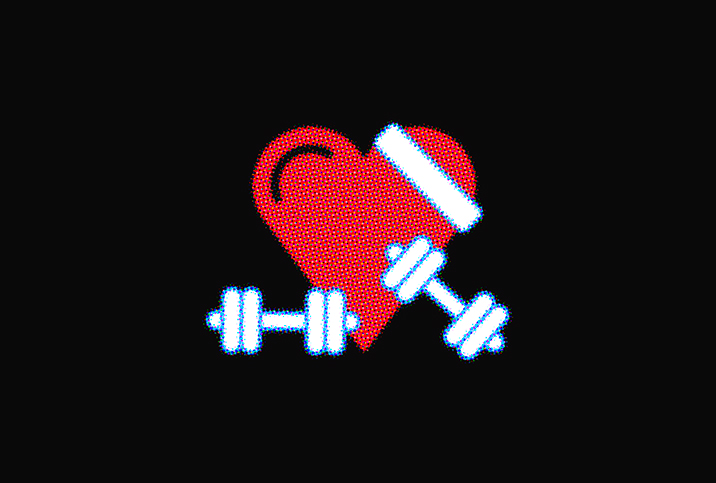How Exercise Improves Men's Sexual Health

Men, women, children and anyone else can reap the benefits of exercise. From helping prevent weight gain to reducing the risk of major chronic diseases such as heart disease and diabetes, exercise is something for which everyone should make time.
But there are reasons men, specifically, should consider including physical activity in their day-to-day lives. These reasons include sexual health benefits as well as reducing the risk of sex-specific issues such as erectile dysfunction (ED) and prostate cancer.
Men's exercises
The ins and outs of exercise are similar for all adults. The Centers for Disease Control and Prevention (CDC) outlines that all healthy adults should aim to accumulate at least 150 minutes of moderate-intensity aerobic exercise, such as brisk walking, every week. In addition, adults should perform at least two days of strength-building exercises, which target major muscle groups.
If you're not currently exercising, this may sound overwhelming, but it breaks down to about 30 minutes of exercise per day, five days per week. And if strength-building exercises are performed in a circuit format, with little rest between exercises or sets, they can actually double as the recommended moderate-intensity cardio, too.
While there are lots of ways to meet this goal, a sample schedule may include:
- Monday. A 15-minute morning walk plus a 15-minute evening walk.
- Tuesday. Thirty minutes of strength training exercises performed as a circuit. For example, perform 10 repetitions each of bodyweight squats, pushups, walking lunges, dumbbell overhead shoulder presses, dumbbell row, triceps chair dips, dumbbell biceps curls and sit-ups. Then repeat the series two more times without rest between exercises or rounds.
- Wednesday. Thirty minutes of pickup basketball or playing soccer at the park with your kids.
- Thursday. Thirty minutes of strength training exercises performed as a circuit.
- Friday. A 15-minute morning walk plus a 15-minute evening walk.
It's important to remember that exercise preference plays a key role because if you can choose exercises you enjoy and can do confidently, you're more likely to continue doing them.
For instance, a study published in 2018 by researchers from Virginia Commonwealth University found men were significantly more likely than women to enjoy weightlifting, while they were less likely to enjoy moderate-intensity cardio. So even if the CDC's guidelines suggest doing "moderate-intensity cardio" for 150 minutes per week, it's important to find options—like playing sports or strength training—that are most appealing to help you meet those overarching goals.
"Regular exercise decreases the risk of all diseases and mortality from all causes," said Kirk Parsley, M.D., a sleep expert and retired Navy SEAL based in San Diego as well as a medical team member for LegacyExpeditions.net Triple 7 Expedition. "It also helps men maintain blood flow throughout the body, enhancing muscularity and reducing the severity of male pattern baldness. Blood flow to the skin and genitals also makes sexual dysfunction less likely and improves sensation during sex. Maintaining cognitive function through balanced neurochemistry and blood flow is one of the major benefits of regular exercise and, in many cases, can counteract the risk of inherited genetic diseases."
Risks and benefits
When started slowly, conscientiously and progressively, an exercise program carries very few risks and offers a slew of potential benefits.
"If a man is completely untrained—has never exercised regularly in his life—and he is over 30-ish, he should be evaluated by a physician for serious cardiovascular risk as well as musculoskeletal stability and movement prior to starting an exercise program," Parsley explained. "For example, if a man has always been overweight, has never played sports or wasn't active growing up, he may well have some biomechanical deficits that would make certain exercises more dangerous than would be worth the risk. However, generally speaking, men are no more or less likely to get any specific injury from exercise. The exercise dictates the risk."
If you haven't exercised in some time, schedule a quick health screening with your doctor to make sure there aren't any specific exercises to avoid. Then consider enlisting a trainer for a few sessions to help you perfect your form and start a safe, well-designed program.
Certain exercises pose a higher level of risk because performing them incorrectly (or doing too much too soon) can place undue stress on the joints. If you're new to exercise, it's best to ensure you're doing each movement correctly.
"Dead lifts are risky for low back injuries, running is risky for knee and hip injuries, [and] swimming, boxing or any racket sport has a higher risk of shoulder injuries," Parsley said.
Even if the risk of an injury is slightly elevated due to the specific movement, the risk can be mitigated by perfecting proper form and gradually increasing workout intensity.
"If you start by exercising at a moderate pace, tempo and intensity, and gradually add short bursts of higher-intensity exercise progressively over months to years, you can do any exercise without unreasonable risk-to-reward benefits," Parsley said.
And about those rewards? They're extensive. The National Library of Medicine's MedlinePlus information resource highlights the following:
- Boosts mental health and mood
- Enhances sexual health
- Helps keep cognitive health sharp with age
- Helps manage blood sugar and reduces the risk of developing type 2 diabetes
- Improves sleep
- Increases the likelihood of living longer (and living better as you age)
- May help you quit smoking
- Reduces the risk of cardiovascular disease
- Reduces the risk of falls
- Reduces the risk of some cancers, including colon, breast, lung and prostate
It's important to note that while these benefits apply to men and women, a few of them should be of particular interest to men.
"Regular exercise lowers the risk of diabetes and high cholesterol, as well as lowers the risk of high blood pressure, which is elevated, in particular, in this gender," said Rathna Nuti, M.D., an orthopedic physician at DFW Sports Medicine in North Texas.
Exercise and sexual health
One of the reasons exercise is so beneficial for men lies in how it can benefit sexual health. Arguably, this could be one of the biggest motivating factors for starting and maintaining an exercise program.
Benefits to sexual health are not emphasized as often as some of the other reasons to exercise, such as reducing the risk of heart disease. However, the increased blood flow that helps reduce the risk of heart disease is actually the same reason exercise can improve sexual health.
"Regular exercise impacts men's sexual health by increasing the circulation of blood flow to various areas of the body, which helps ensure a healthy circulatory system," Nuti explained. "A strong, smooth blood flow is key for arousal, which helps with erections and increases libido in men. Men who exercise more often are less likely to suffer from sexual dysfunction."
"Sexual health is hugely impacted by fitness, for endurance, strength, the ability to move in certain ways, hold certain positions and carry your partner's weight," Parsley added. "However, high-intensity interval training [HIIT], a certain form of exercise, has been shown to increase testosterone levels, as can weightlifting or competitive sports. Testosterone has an impact on sexual desire, sexual confidence and oftentimes erection quality and duration. Cardiovascular fitness is not only beneficial to sexual performance, but the reverse is true, too. Poor cardiovascular fitness is often associated with greater difficulty getting and maintaining an erection."
Exercise and ED
As Parsley and Nuti both pointed out, the impact exercise has on blood flow and circulation can positively influence the ability to get and maintain an erection. Believe it or not, studies have investigated the kinds of exercise that make a difference.
A study published in 2018 in the journal Sexual Medicine observed the impact and results of multiple exercise interventions to improve ED and concluded 160 minutes of moderate- to vigorous-intensity exercise performed each week for six months would help decrease erectile problems in men with ED. The study authors recommended 40 minutes of this kind of training four days per week.
If you currently aren't exercising and the thought of carving out two and a half hours per week from your schedule for exercise seems daunting, remember that something is better than nothing. You can work your way up to the goal of 150 to 160 minutes of exercise each week by starting with 10 to 15 minutes of exercise per day.
Consider all the ways it can benefit your health, including your sexual health, and you'll soon realize that once the habit is formed, it's going to be worth the effort and time. The trick is simply finding the form of exercise that you enjoy.


















